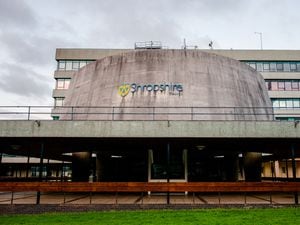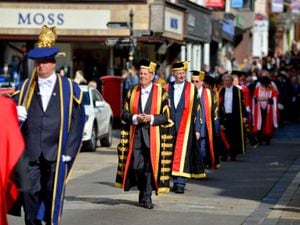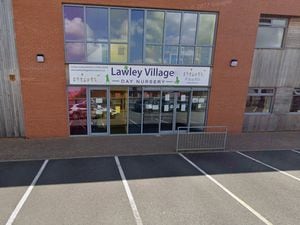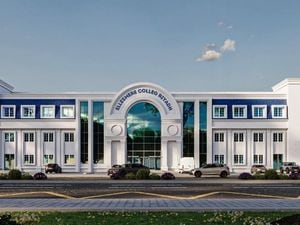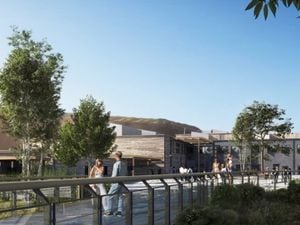'Life is about learning' say Ludlow couple studying for PHDs in their 60s
In their own words, they are at an age when most people are thinking about slowing down and retiring.
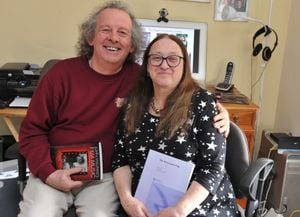
But married couple David Etheridge and Angela English have shunned the idea of putting their feet up and have instead thrown themselves into the world of essays and deadlines as they work towards their PHDs.
Musician David, 68, and film lecturer Angela, 67, who live in Ludlow, share a joint passion for learning and say they would much rather keep busy than succumb to old age.
"We are at the age when most people want to sit around listening to their arteries hardening," said David.
"We have no intention of stopping. There are always things to find out, there are always new mountains to climb."
Angela began her full-time PHD at Birmingham City University in 2016, after securing funding from the Arts and Humanities Research Council through the Midlands3Cities consortium.
She is hoping to submit her thesis on local archive films of London in the new year.
Before moving to Ludlow 10 years ago, Angela lived in London and worked on the London Screen Study Collection, which forms the basis for much of her research.
Her studies involve her taking archive footage out to be screened at different locations and gathering reactions.
"When I moved here it carried on and came out of London and became more national," she said.
"It has been really interesting. One of the pieces of research I did was to interview 13 different people working with archive films across the country. Nobody has done that before, sat down with these people and asked, 'what do you do?', so that was fascinating.
Unusual
"David is doing his PHD on an aspect of music, and we went to Dublin together for a conference where we both gave lectures, so there is some king of crossover. We keep each other going."
Describing themselves as "very mature students," both David and Angela know of just one other student at their respective universities of a similar age.
Angela said: "It is very unusual for people of our age, and a married couple as well."
Having only got married three years ago, they joke that they are doing everything later in life.
Angela said: "A lot of people have said to me, 'why do you want to do this now?'
"It is about learning and continuing to learn as you get older."
While Angela has almost completed her PHD, David is just two years in to his part-time studies.
He had devoted his life to music, attending the Royal College of Music in his twenties and gaining his RCM Certificate in double bass.
What followed was a varied and successful career – as a musician, musical director, composer, music teacher and music journalist – which saw him work with world renowned musicians including Stephane Grappelli and Nigel Kennedy.
"I have done lots of things in music throughout my life," said David.
"In 2016 all my double bass pupils had grown up and I thought, 'what will I do now?'
"My wife had been lecturing at Birkbeck for many years and she had a chance to do a PHD. I thought, 'I would like to do that'.
Directions
But David was not able to dive straight into a PHD without first completing a masters' degree.
For 10 years he had been conducting the West Midlands Light Orchestra, and chose to focus on the BBC Radio Orchestra for his MA dissertation.
In 2017, with his MA in hand, David embarked on a PHD at Middlesex University, focussing on the music of Barry Gray, composer of Thunderbirds theme tune.
Studying part-time around his work, David has around three to four years left of his studies and is enjoying every minute.
He said: "When you go into a PHD you have to do a lot of reading, and academic reading uses a lot of its own language, so you find yourself reading lots of things you would not have thought about reading. It opens up a lot of new directions.
"The thing with Barry Gray is that he was writing for TV in the 60s, so he would have to compose music in very short chunks and put them un tapes, and he could assemble them in different orders. It's called modular composition. He was a great recording pioneer."
David is already thinking about what to focus on next. He said: "I would like to put Barry Gray on the music platform and get some of his music performed live.
It is the first major study on Gray's music, but David is having to self-fund his groundbreaking research due to student loans being unavailable to the over-60s.
He said: "The government is always on about lifelong learning, but when you turn 60 they expect you to sit at home with a blanket around your feet. It is just absurd.
"People of a certain age have experience and knowledge that you can share with others.
"You don't have to give up, there is always something you can do."

